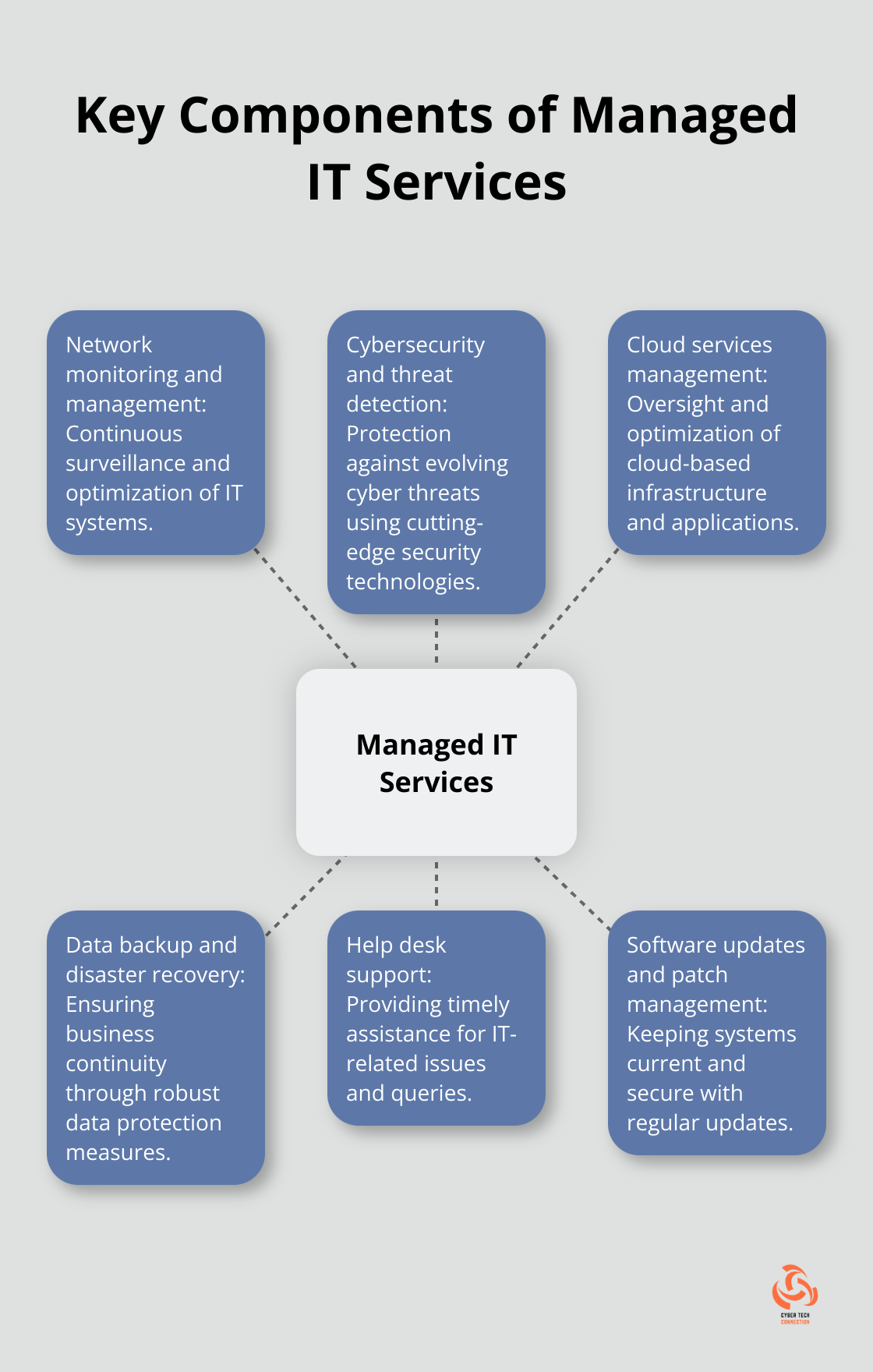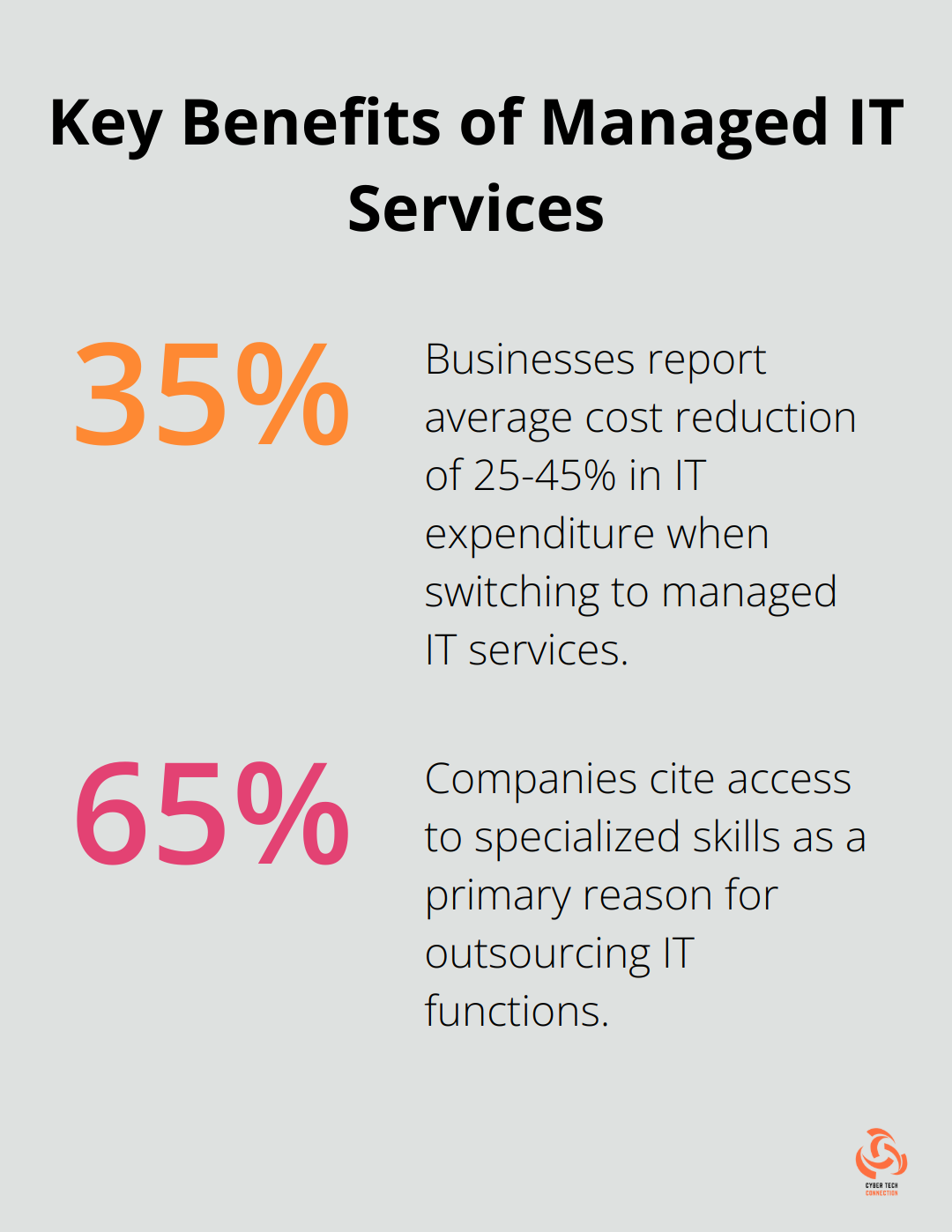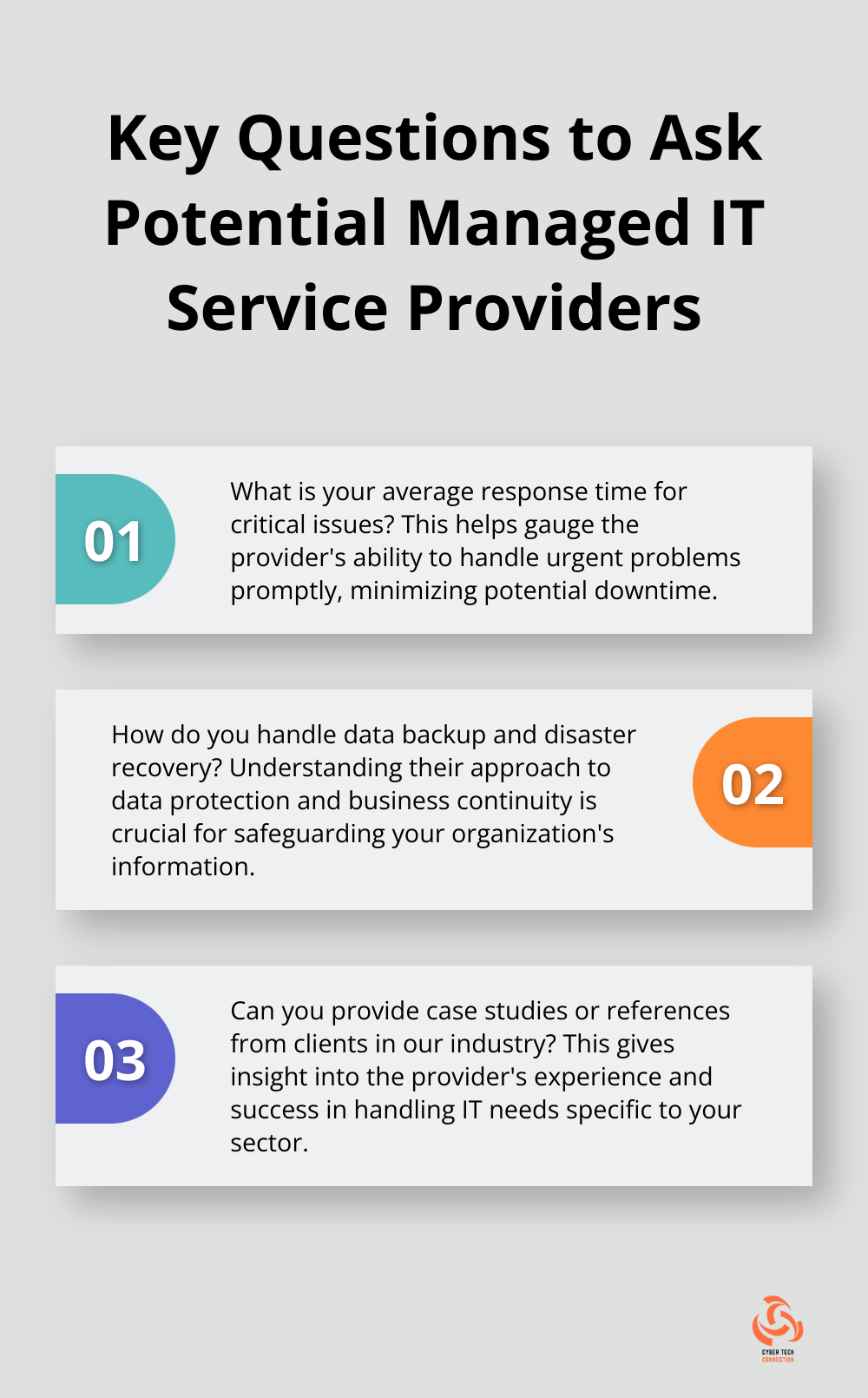What Are Fully Managed IT Services?
Comprehensive IT Solutions
Managed IT services are comprehensive solutions provided by an external organization to handle a company’s IT needs. This includes monitoring, managing, and maintaining an organization’s IT infrastructure.
The Scope of Managed IT
Fully managed IT involves the outsourcing of all IT functions to a specialized provider. This provider assumes responsibility for maintaining, updating, and optimizing all IT systems. A recent survey revealed that 35% of businesses are actively adopting AI, showcasing the rapid integration of AI technologies across various industries.
Managed IT services typically include:
- Network monitoring and management
- Cybersecurity and threat detection
- Cloud services management
- Data backup and disaster recovery
- Help desk support
- Software updates and patch management

Key Components of Managed IT Services
Proactive monitoring stands as a critical component of managed IT. This involves continuous surveillance of an organization’s IT systems to identify and address potential issues before they escalate.
Cybersecurity forms another essential element. With rapidly evolving cyber threats, managed IT providers invest heavily in cutting-edge security technologies and expertise. This level of protection often proves prohibitively expensive for many organizations to maintain in-house.
Managed IT vs. In-House IT
The primary difference between managed IT and in-house IT lies in the approach to IT management. In-house IT teams often operate reactively, addressing issues as they arise. In contrast, managed IT services take a proactive stance, continuously monitoring and optimizing systems to prevent problems.
Cost serves as another significant differentiator. While in-house IT requires substantial upfront investment in hardware, software, and personnel, managed IT services operate on a predictable monthly fee model. This can result in significant savings, especially for small to medium-sized businesses.
Scalability comes easier with managed IT. As a business grows or its needs change, a managed IT provider can quickly adjust their services to match. This flexibility often proves challenging to achieve with an in-house team.
The benefits of fully managed IT services extend beyond mere technical support. These services provide a strategic advantage, allowing businesses to focus on their core competencies while leaving IT management to the experts. In the next section, we’ll explore these benefits in more detail, highlighting how managed IT can drive business growth and innovation.
Why Fully Managed IT Services Are a Game Changer
Cost Reduction and Efficiency Boost
Fully managed IT services revolutionize how businesses approach their technology needs. These services offer substantial cost savings. A study by CompTIA reveals that businesses switching to managed IT services report an average cost reduction of 25-45% in their IT expenditure. This isn’t just about cutting expenses; it’s about optimizing IT budgets for maximum impact.
For instance, a mid-sized manufacturing company reduced their IT costs by 37% in the first year after switching to fully managed IT services. They eliminated the need for expensive hardware upgrades and reduced downtime, which directly impacted their bottom line.
Access to Cutting-Edge Expertise
The IT landscape evolves at breakneck speed. Keeping an in-house team up-to-date with the latest technologies and threats presents a constant challenge. Fully managed IT services provide access to a pool of specialists with diverse skill sets.
A Deloitte survey found that 65% of companies cite access to specialized skills as a primary reason for outsourcing IT functions. This expertise translates into real-world benefits. When a new zero-day vulnerability was discovered, some managed service providers patched their clients’ systems within hours, while many businesses with in-house IT teams took days (or even weeks) to respond.
Enhanced Digital Defense
Cybersecurity is no longer optional; it’s a necessity. The average cost of a data breach in 2023 was $4.45 million (according to IBM’s Cost of a Data Breach Report). Fully managed IT services provide robust security measures that many businesses can’t afford or manage on their own. Network security management helps companies protect themselves from cyberattacks 24/7 by managing firewalls, monitoring and detecting unauthorized activities.
This plays out in real-time. A small financial services firm (targeted by a sophisticated phishing attack) avoided data compromise thanks to advanced threat detection systems and 24/7 monitoring provided by their managed IT service. This level of protection would have been out of reach for them without a fully managed IT service.

Focus on Core Business Activities
Fully managed IT services free up internal teams to focus on core business activities. Instead of troubleshooting IT issues, employees can dedicate their time and energy to tasks that directly contribute to the company’s growth and success.
Scalability and Flexibility
As businesses grow and evolve, their IT needs change. Fully managed IT services offer the flexibility to scale IT infrastructure as needed. This scalability ensures that businesses always have the right level of IT support, without the need for constant reassessment and adjustment of in-house IT resources.
The next chapter will explore how to choose the right managed IT service provider, ensuring you find a partner that aligns with your business needs and goals.
Finding Your Perfect IT Partner
Assess Your IT Requirements
Before you start your search, conduct a comprehensive assessment of your current IT infrastructure and future needs. This evaluation should include an inventory of your hardware, software, network setup, and security measures. Identify pain points in your current IT operations and areas where you need additional support or expertise.
A recent survey by Spiceworks found that 64% of businesses plan to increase their IT budgets in the coming year (with cybersecurity and cloud services as top priorities). Understanding your specific requirements in these areas will help you narrow down potential providers.
Consider Key Selection Criteria
When you evaluate managed IT service providers, look at their track record and industry experience. Seek providers with a proven history of success in your specific industry. For example, if you operate in the healthcare sector, look for providers with experience in HIPAA compliance and medical data management.
Scalability is another important factor. Your chosen provider should accommodate your business growth. A CompTIA study shows that 70% of businesses that switch to managed services report significant reductions in unexpected IT costs.
Security capabilities are paramount in today’s threat landscape. Ask about the provider’s security protocols, certifications, and incident response procedures. A 2023 report predicts that cybercrime costs will grow by 15 percent per year over the next five years, reaching $10.5 trillion USD annually by 2025, underlining the importance of robust security measures.
Ask Probing Questions
When you interview potential managed IT service providers, ask pointed questions to gauge their capabilities and fit:
- What is your average response time for critical issues?
- How do you handle data backup and disaster recovery?
- Can you provide case studies or references from clients in our industry?
- What certifications do your technicians hold?
- How do you stay updated with emerging technologies and threats?
These questions will help you assess the provider’s expertise, reliability, and commitment to staying current in the rapidly evolving IT landscape.

Review Contract Details
Pay close attention to the service level agreement (SLA) when you review contracts. The SLA should clearly define performance metrics, response times, and penalties for non-compliance. Be cautious of providers who hesitate to include specific, measurable commitments in their SLAs.
Watch out for long-term contracts with hefty early termination fees. Flexibility is key in the fast-paced IT world. A Gartner report states that 89% of board directors say digital business is now embedded in all business growth strategies. This underscores the need for an IT partner that can adapt to changing business needs without contractual constraints.
Final Thoughts
Fully managed IT services have become essential in today’s business. These services offer a strategic advantage, allowing organizations to focus on their core competencies while experts handle IT management. The benefits extend far beyond cost savings, providing access to cutting-edge expertise, enhanced cybersecurity measures, and the scalability needed to adapt to changing business requirements.
Organizations considering the shift to fully managed IT services should start with a thorough assessment of their current IT infrastructure and future needs. This evaluation forms the foundation for selecting the right service provider that aligns with business goals and possesses the necessary industry expertise. Careful consideration of factors such as scalability, security capabilities, and contract terms is important in making an informed decision.
At Cyber Tech Connection, we understand the transformative power of fully managed IT services. Our team of experts offers a comprehensive range of services designed to meet diverse business needs. We strive to ensure your network remains secure, up-to-date, and optimized for peak performance.

